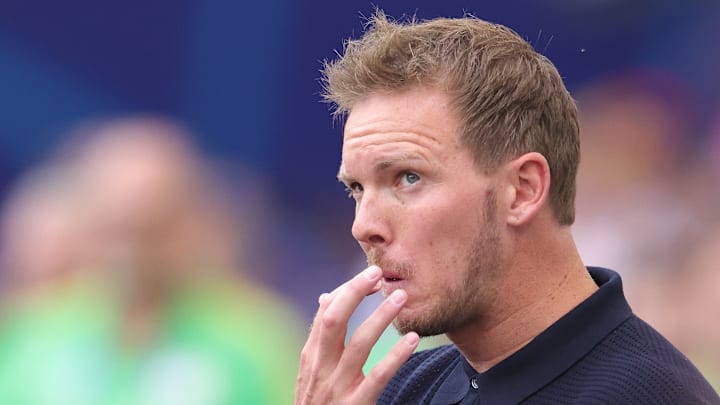Serious changes are underway with the German national soccer team, which might just signal the beginning of a new era. The young, innovative coach Julian Nagelsmann, at the helm of the German national football team at just 35, was in no mood to waste time on his major decisions regarding an integral structural renovation-everything from their new first goalie, Marc-André ter Stegen, taking the place of the legendary Manuel Neuer to the new captain, Joshua Kimmich.
Follow Playing for 90 on X (Twitter).
Ter Stegen - Germany's New Guardian

Marc-André ter Stegen finally took the mantle that many felt was due to him all along: Germany's No. 1 goalkeeper. Ter Stegen has had to play second fiddle to Neuer for years now, sitting on the bench while he watched the veteran command German defense with skill unmatched by few. Now that Neuer is retiring after 15 years of impeccable service, Ter Stegen will take his first chance to prove to the world that he can answer the call.
Nagelsmann did not beat about the bush: "Marc is the number one. Deservedly the number one. He's shown outstanding performances at Barcelona and over the years." This sums up a lot of confidence in the Barça goalkeeper, who time and again has been able to show his worth at club level and in the few opportunities he has had with the national team. With 39 official games for Germany, always in Neuer's shadow, Ter Stegen now has to bear responsibility as the last line of defense in a post-Neuer era.
The pressure will be immense, with Neuer's legacy huge and the comparisons inevitable. But Ter Stegen is not a kid. His experience in Barcelona, where he faces some of the best forwards in the world, prepares him well enough for this role. Every action he makes, every ball that he touches, will be under the scrutiny of fans and pundits, who wish to see if he can keep the defensive solidity that Neuer gave to them for years.
Kimmich: The New Voice of Leadership

The simultaneous announcement alongside this change in goal saw Nagelsmann introduce the new captain of the German national team in Bayern Munich right-back Joshua Kimmich. Now 29, Kimmich has managed to chalk up 91 caps for Germany and has managed himself to be renowned as a highly disciplined player, especially in his commitment to the game. Nagelsmann stressed those qualities when naming him captain: "For me, the captain is he who communicates his team's opinion to the coaching team, not the other way round. Josh is an outright role model in the way he does his job".
The versatile Kimmich, who can feature in midfield, has been called to lead a team trying to reboot after a lackluster quarterfinal exit in the last Euros. He took over from Ilkay Gündogan, the experienced and respected player who could not take Germany beyond expectations at recent tournaments. Kimmich's selection reflects Nagelsmann's desire to inject some fresh energy and direction into the team. This will be absolutely indispensable if the team is to see success in the Nations League, among other coming competitions and qualifications to the 2026 World Cup.
He has a heavy burden on his shoulders. Behind the legends of German soccer come Franz Beckenbauer, Lothar Matthäus, Philipp Lahm, and Bastian Schweinsteiger-all those who left an indelible memory in the history of the national team. Now it is time for Kimmich to create his place in history. Serious and leading by example, he has everything to become one of the great German captains.
Future of Germany Under Nagelsmann's Command
Ter Stegen's appointment as captain, with Kimmich as vice-captain, was a signal of Nagelsmann's future vision for the German national team. He reportedly prepares a squad that will balance experience with youth, discipline with creativity, tradition with innovation. On his watch, Germany would bank on getting back to form that made them one of the most dreaded teams in the world.
Nagelsmann also expressed the need for collective leadership in the team, naming vice-captains like Antonio Rüdiger and Kai Havertz, and creating a council of leaders including Ter Stegen, Niclas Füllkrug, Pascal Gross, and Jonathan Tah. This teamwork is directed at ensuring there are various leaders on the pitch who would be able to lead Germany through the challenges ahead.
The Immediate Challenges: The Nations League and Beyond
The Nations League-the games with Hungary and the Netherlands-will also be the first real test of this new structure for Germany. The performances in these games could also provide something of an early indicator of what the future might hold under Nagelsmann in light of Euro 2024.
Germany enters this competition cautiously but optimistically. The retirement of Neuer, the promotion of Ter Stegen to that spot, along with Kimmich with his new leadership mantle, introduces a new era that will probably define the success of this national team in the years to come. For sure, the rejuvenated squad, with the traditional German winning mentality and Nagelsmann's tactical innovations, is going to be a sight to see.
